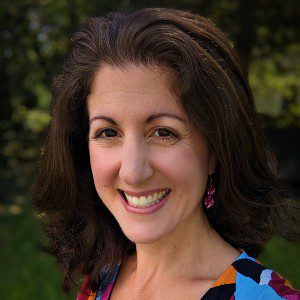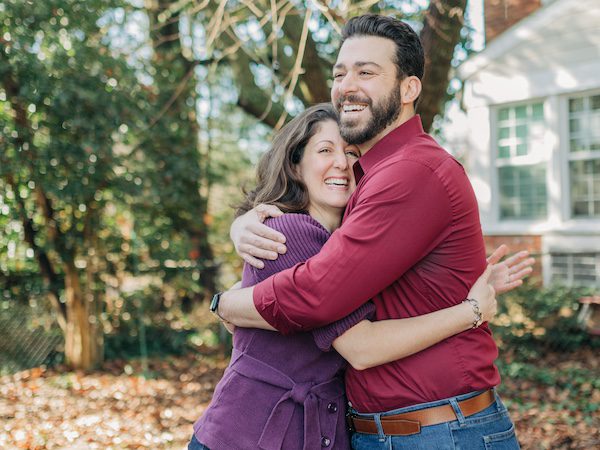My brother told me he was an atheist at the start of a car ride. He opened up the conversation as if he were coming clean. “I want to have faith,” he said. “I really do. But I have to be honest and say I don’t.”
At first I was taken aback. I knew my brother wasn’t following any religious doctrine, but I had never stopped to think that might imply his total lack of belief in any deity. I’m a person of faith. A person with faith. Imperfect faith, variable faith, doubtful faith—but still faith in a Higher Power.
Then I felt naive, almost narrow-minded. Why had I assumed my brother believed in God? Because he was a good person? Because he expressed morals and values similar to mine? Because believing in God is what our observant Roman Catholic family was supposed to do? Because I believed in God?
Then I wondered: Did his not believing in God make him any less of a kind or worthy person? Did it prevent me from seeing him as a child of God? And if my personal, honest answer to either of these questions was yes, then what did that reveal about me and the quality of my own belief?
I was upset. Really upset. Heart-on-the-floor-mat kind of upset. But I couldn’t cry because we were in the car together having this talk and I didn’t want to dissuade him from sharing his thoughts. I wanted to hear what he had to say, which turned out to be thoughtful, well-reasoned. My brother had not reached his conclusion quickly or lightly. He had examined all sides and discerned where he stood, a practice to admire in anyone of any tradition.
We went back and forth on various points. To be clear, I wasn’t trying to convince him of anything. I believe God works within people individually and each person’s spiritual journey is theirs alone. (Plus I’m a terrible debater and fold like a pile of laundry.) Instead, we talked about the constructs of the atheist vs. theist debate. He said he didn’t understand why the burden of proof is on the atheists. I said believers and non-believers alike have a faulty premise: that trying to wrap scientific laws around something as intangible, amorphous, and stubbornly unscientific as faith can’t help but lead to circular arguments and insufficient evidence.
Then we talked about the meaning of life without ever really using those terms. He said he’s in awe of the earth and the wondrous complexity of human existence without needing a Creator behind them. I said that mortality terrifies me and the idea of an afterlife brings a measure of peace.
Then it was my turn to come clean. Really clean.
“Fran,” I said, “I have to be honest too. I believe because I want to.”
“I appreciate that,” he said. “I wish more people would admit it.”
Why was I ready to burst into tears then, and for the next 24 hours, and even now as I remember it?
Because questions about suffering, death, and the meaning of life are the waves that rock my little skiff hardest. Because my brother made me realize (admit?) how much I want people I love to share my beliefs. Why, I’m not sure. I think because for all the struggle that believing entails, it ultimately brings me joy, and I want others to experience joy, too.
Because I’ve never been able to conceive of nothingness without fear creeping in.
Because pondering whether people can end up in a heaven they disavow makes my head and heart hurt.
And because of many other big, daunting, mysterious, sentimental, melancholy, confused reasons I could not articulate right then in the car and still cannot today.
When the waves of questions and doubts threaten to sink me, I recall a memory from my early childhood when my brother and I would play hide-and-seek with our mother. I hadn’t yet learned the art of silence, so my mom usually followed my laughter to find me. My brother, three years younger, thought that sitting in a corner, putting his hands over his eyes, and saying “I am nowhere to be found” rendered him invisible. When it was Mom’s turn to hide, she played her ace: the ability to remain quiet.
I’d take one floor. My brother would take another. I’d peer in all the spots a big kid could reach. But my brother would play the baby card: a plaintive, repeating refrain of “Mommy, where oo?” that never failed to touch her heart and call her forth from her hiding spot.
Sometimes I think I’m playing the baby card with God. How much easier it feels to wander around in a sad daze, sucking my thumb and tugging at God’s heartstrings—“God, where oo?”—until my longed-for subject appears.
But the easiest path is not necessarily the most enriching. Certainly I can ask God where they are, but I too must be out in the open. No covering my eyes. No pretending I’m invisible. If I am going to profess my faith—to declare that I am a person who wants to encounter and experience a force greater than my own self—then I must say it out loud and not in hiding, so that people can hear, disagree, and help me cultivate a mature, examined, freely chosen belief.
My response to the atheist I love may not seem enough to those of you with greater conviction than I. But I could answer only from my heart, and it continues to answer the truest it can.
This article is adapted from Amen? Questions for a God I Hope Exists by Julia Rocchi.

Julia Rocchi writes prose, poetry, and prayers. She holds an MA in Writing and has published stories in Furious Gravity and Dappled Things, and other stories in the Saturday Evening Post, jmww, Bourbon Penn, 3Elements Review, Reflex Fiction and others. Julia’s book, Amen?, is a collection of graceful musings, prayers and poems for a wandering, wondering, doubt-laden, hope-filled faith that reflects the desire to believe as much as belief itself. Julia blogs at www.juliarocchi.com and lives in northern Virginia with her family.


